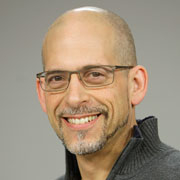Mark Johnson honored with Anthony Shadid ethics award
The Center for Journalism Ethics at the University of Wisconsin–Madison will honor Milwaukee Journal Sentinel health and science reporter Mark Johnson with the Anthony Shadid Award for Journalism Ethics, at the center’s annual conference April 5, 2013.

Mark Johnson has been honored with the Anthony Shadid Award for Journalism Ethics.
A committee of working and retired journalists considered Johnson’s work in the series “Uniquely Human: The Science of Gender,” which probed the role of nature and nurture in gender identity.
A Pulitzer Prize-winning science writer, Johnson tapped his expertise honed from years of covering DNA and stem cells to delve into the rarely examined science of gender. “In his series, Johnson blended the complexities of science with the simple rhythms of daily life,”writes Martin Kaiser, editor of the Milwaukee Journal Sentinel in his nomination of Johnson.
Honored and humbled by the announcement of his win, Johnson noted that both his sources and editors guided him on the more difficult elements of his stories. “Ethics,” said Johnson, “aren’t something that you are supposed to do, but just something you do. It’s just a part of doing our job.”
The selection committee will present the award to Johnson on April 5 at the fifth annual Journalism Ethics Conference, sponsored by the Center for Journalism Ethics in the UW–Madison School of Journalism and Mass Communication.
For more information on the award and to register for the conference, visit http://ethics.journalism.wisc.edu.
The award, previously known as the Wisconsin Commitment to Journalism Ethics, was renamed in 2012 in honor of the work of Anthony Shadid, a 1990 UW–Madison graduate who died while on covering Syria for the New York Times.
Shadid’s international reporting won him two Pulitzer Prizes. He was a member of the advisory board for the Center for Journalism Ethics.
“Anthony Shadid’s journalism captured the essence of responsible public-interest journalism,” said Stephen J. A. Ward, the center’s director. “Mark Johnson’s journalism upholds the values that Anthony Shadid practiced every day in the field.”
Johnson joined the Journal Sentinel in 2000. He previously worked for the Provincetown (Mass.) Advocate, The Haverhill (Mass.) Gazette, The Rockford (Ill.) Register Star and The Providence (R.I.) Journal. At the Journal Sentinel, he has traveled to Florida to cover the 2000 presidential ballot controversy, to New York to cover the Sept. 11 attacks and to Houston to cover the space shuttle Columbia disaster
Johnson’s work has previously been honored. He was part of the team that received the 2011 Pulitzer Prize in Explanatory Reporting for a series of reports on the use of genetic technology to save a 4-year-old boy imperiled by a mysterious disease. On two other occasions he was part of reporting teams that were finalists for the Pulitzer in Explanatory Reporting, in 2003 and 2006. He won the 2009 Communications Award from the National Academy of Sciences and shared the award in 2012 with a team for work on the Journal Sentinel’s “Empty Cradles” project, which examined Milwaukee’s infant mortality crisis. He won the 2011 National Headliner Award for medical/health/science writing and was a finalist for the 2010 American Society of News Editors award for non-deadline writing.
Johnson was the committee’s unanimous choice.
